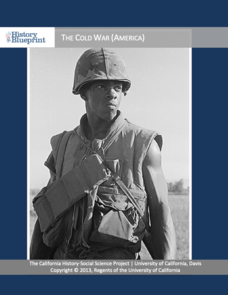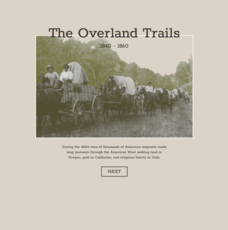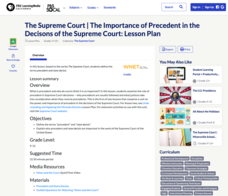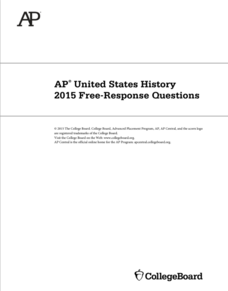PBS
Latino Americans Share Their Experiences
Three Latino Americans are the focus of an interactive that spotlights their accomplishments. Scholars get to know Lin-Manuel Miranda, Judy Reyes, and José Hernández through short informative text and videos. Participants read, take...
University of California
The Cold War (America)
The Cold War—with its roots in World War II—impacts the world today. Using an extensive curriculum, scholars consider its impact through primary sources, including speeches and propaganda, as well as other skills-enhancing activities. An...
Syracuse University
American Industrial Revolution
While the Industrial Revolution may have fueled America's rise to the top of world markets, the child laborers often faced dangerous conditions. Using primary source images and other information, scholars consider what these children...
PBS
Organizing the Farm Worker Movement
The food on young scholars' tables was likely harvested by hands that fought for fair wages and working conditions. By examining the life of Cesar Chavez and Dolores Huerta, learners connect their daily meals with the struggles of those...
Syracuse University
Erie Canal
While canals are not the way to travel today, in the first half of the nineteenth century, they were sometimes the best way to move goods and people. Scholars examine primary sources, including maps and pictures, to investigate the role...
Syracuse University
Harlem Renaissance
The music and literature of the Harlem Renaissance defined American culture, including its poetry. Using a poem from the period, individuals explore its musical qualities and how it is reflective of the period. Then, they use what they...
History with Peters
A Clear Signal for Change: Multiple Interpretations and Nat Turner’s Rebellion
Was Nat Turner a hero or a violent criminal? Using primary sources and images that discuss the rebellion of enslaved people he led in antebellum Virginia, scholars consider the question. Then, they create memorials to Turner and...
PBS
Latino Americans: Timeline of Important Dates
From 1500-2000, an interactive timeline details important events related to Latino Americans. Next, to each date are small, yet informative blurbs—some of which include videos.
University of Richmond
Foreign-Born Population 1850-2010
If America is a nation of immigrants, where are they from and why did they come? Demographic data and interactive maps help pupils consider answers to these questions by examining the statistics of foreign-born Americans. Features allow...
University of Richmond
The Overland Trails 1840-1860
What led Americans to head west in the 1800s? Using an interactive map and journals from those who traveled, pupils explore the stories of those who migrated. In addition, they see how the numbers fluctuated in response to the push-pull...
Benjamin Franklin Tercentenary
Many Bens: Character Revealed in Writing
Benjamin Franklin may be known as a Founding Father, but he was also a prolific writer. Scholars examine his better-known pieces to learn about genre, voice, and early American history. The resource includes options for various...
Benjamin Franklin Tercentenary
Join, or Die: Reenacting the Albany Conference
The Albany Congress was one of the first attempts at colonial unity. While it was an effort against the French during the French and Indian War, it was one of the events leading up to the American Revolution. Scholars consider the...
National WWII Museum
Pearl Harbor: Analyzing FDR's Pearl Harbor Address
FDR's words calling the attack on Pearl Harbor a "day in infamy" have been immortalized. Learners use analysis and discussion questions to consider the origins and drafting of the famed speech that brought the United States into World...
Benjamin Franklin Tercentenary
Simple Machines, Ben Franklin and the Technology of the 1700s
Benjamin Franklin was an inventor, and he was fascinated by the mechanics of machinery. Using a fun exploration, pupils examine simple machines from the pre-Industrial era. Then, they must identify and build their own using common objects.
Americans All
A Simulation: The Peopling of America
What was it like to pass through Ellis Island? Learners move through the immigration process of the early 1900s in a simulation activity. A comprehensive activity includes role-playing profiles and other manipulative items such as...
Benjamin Franklin Tercentenary
Franklin’s Philadelphia: Another Point of View
While Benjamin Franklin enjoyed fame and success in colonial Philadelphia, that was not the experience of all coming to the British colonies. Young scholars trace the life of an indentured servant using a scholarly biography and reading...
Benjamin Franklin Tercentenary
What Good May I Do: Franklin and the American Civic Association
Benjamin Franklin may have been a Founding Father of the United States, but he also founded a number of civic associations. Learners explore his legacy using a biographical essay and collaborative activity. After their exploration,...
Benjamin Franklin Tercentenary
Lists to Live By: Developing a Self-Improvement Plan
Ben Franklin was a man with a plan. Learners investigate his plan for self-improvement using excerpts from Franklin's autobiography. Then, pupils develop their own plans and discuss how to sell them to others using the two-session lesson...
National Endowment for the Humanities
Lesson 2: The United States, France, and the Problem of Neutrality, 1796–1801
While the French Revolution could be considered inspired by the American Revolution, it created thorny problems for the new United States. Should the United States get involved and be drawn into a European drama? Was the US strong...
National Endowment for the Humanities
Lesson 3: Britain, Napoleon, and the American Embargo, 1803–1808
While the French were once the allies of Americans, the Napoleonic Wars saw the United States almost drawn into a war with its one-time friend. Wars in Europe threatened to draw in the early republic. A primary source-based activity...
PBS
The Supreme Court: The Importance of Precedent in the Decisions of the Supreme Court
People often hear the words precedent and Supreme Court together, but why? A resource on the Supreme Court includes a variety of discussion questions, handouts that guide young historians, a video about Nixon and the court system, and...
Middle Tennessee State University
The Declaration of Independence: Its Legacy and Ideas in Today’s World
How is it possible that such an old document still triggers modern discussions? Teach scholars why the Declaration of Independence is still so important today using an informative resource. They watch various educational videos, work in...
ProCon
Cuba Embargo
President John F. Kennedy bought 1,200 Cuban cigars the night before he enacted the Cuban trade embargo in 1962. Should the United States maintain the embargo? Using the website, pupils explore the topic to prepare for a class debate or...
College Board
2015 AP® United States History Free-Response Questions
How do preservationists and conservationists differ? How did the Founding Fathers come to understand the American Revolution? Learners explore the queries and more using authentic College Board materials to prep for upcoming exams.

























